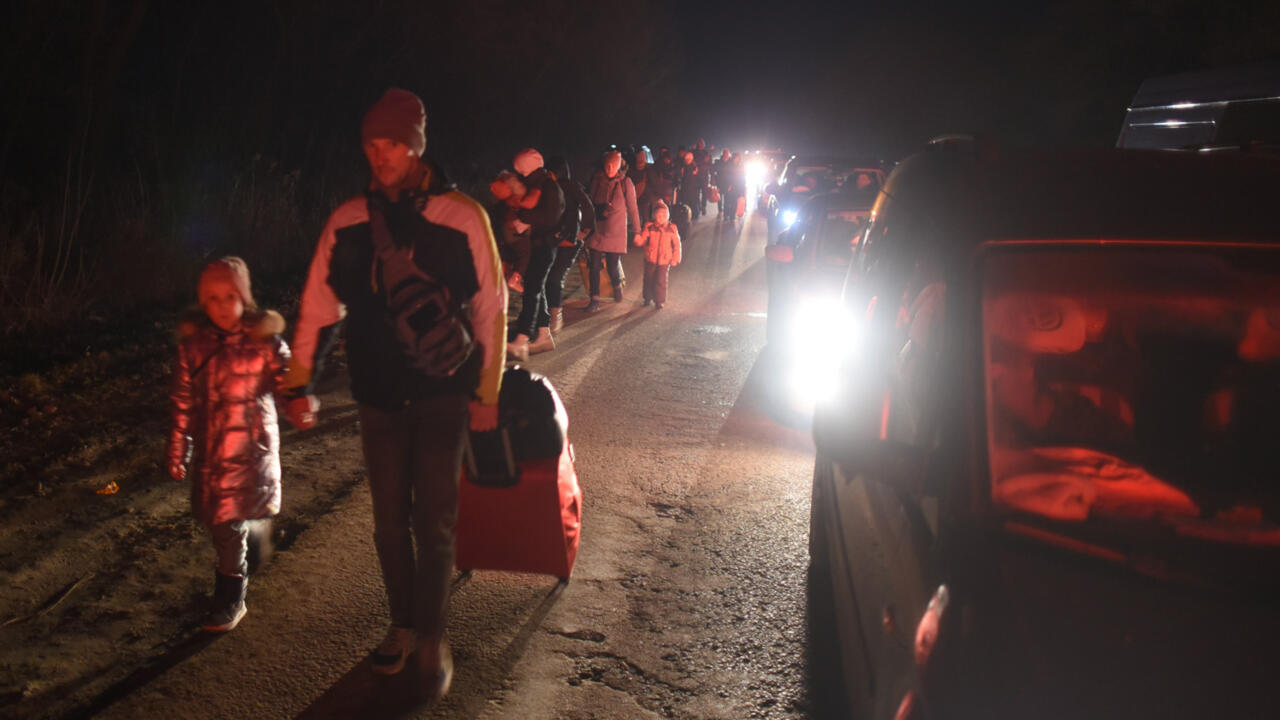State-of-the-art SUVs, old antediluvian Ladas, family cars... Hundreds of vehicles, belonging to Ukrainian women of all social classes, crowd bumper to bumper for about thirty kilometers before the Polish border, on the evening of Thursday, February 25.
As night falls, the silhouettes of haggard pedestrians walking on the side of the road stand out amid the smoke from the exhaust pipes.
This giant traffic jam which is getting longer every hour between Lviv, the main city in western Ukraine, and the border of the European Union is the most tangible sign of the exodus of Ukrainian civilians fleeing the Russian invasion.
And this is just the beginning: the UN High Commissioner for Refugees (UNHCR) said on Friday it was considering "scenarios with ranges of 1 to 3 million people in Poland" in the event of an escalation of the conflict. .
A 30-kilometre traffic jam formed on the evening of February 25 as thousands of Ukrainian civilians streamed towards the Polish border.
© Mehdi Chebil
"We left the night before but as the bus could no longer move, we walked 20 kilometers", confides to France 24 Sofia, a young mother from Tchortkiv met a little earlier.
Entry to the Ukrainian border post is trickling in while thousands of people continue to arrive.
Most are still in shock.
Sofia is stranded on the Ukrainian side of the border with two children aged 8 and 3 and a half.
© Mehdi Chebil
"We saw planes and missiles hitting a military depot fifteen kilometers from our home. It was total panic. How do you explain to the children that you have to leave the house urgently?", exclaims Sofia, the drawn features, pulling up a woolen blanket over the shoulders of the two young children traveling with her.
Around her, women and children are overrepresented.
"Men from 18 to 60 are mobilized for the war and there are several checkpoints on the road to prevent men from fleeing," adds the young woman, whose husband lives in Poland.
There are many women with children flocking to the Polish border.
© Mehdi Chebil
Among the men gathered in front of the border post, there was indeed a significant proportion of foreigners.
France 24 thus met Algerian, Congolese, Nigerian and Indian refugees who were waiting to cross the border.
"I feel sorry for the Ukrainian people because they are really lovely people. We are foreigners and we don't leave anything here... They are forced to leave their homes," said Karim, an Algerian national from 28 years working in finance.
The young man left Kiev with his partner after having spent trying times, holed up in the shelters of the metro to escape the bombardments.
Karim, an Algerian national who lived in Kyiv, queues on the Ukrainian side of the border on February 25, 2022. Many foreigners are currently trying to flee the country.
© Mehdi Chebil
The majority of these thousands of refugees do not have tents or sleeping bags, as they had not planned to spend the night outside.
Those who have a car can leave the engine running to heat the cabin... as long as they have gasoline.
Thursday evening, no humanitarian organization was visible on the Ukrainian side of the border.
Without a massive opening of the border, the situation of civilians fleeing the fighting could deteriorate very quickly.
Ukrainian and foreign civilians line up to try to flee to the Polish border, February 25, 2022. © Mehdi Chebil
Then remains the solidarity between companions in misfortune.
"When I see children who are hungry, cold, and crying, I can't stay idle! I made three round trips between Lviv, Lutsk and the border to transport people on a voluntary basis", says Anatoly , an Israeli-Ukrainian entrepreneur in agricultural equipment.
A stock of cigarettes and energy drinks keeps the 23-year-old going with minimal sleep.
"The Russian army is very strong, it is the second or third most powerful army in the world. But Putin will never be able to impose a new regime in the country in the long term, because the Ukrainians love their freedom too much", advances Anatoly, as he takes the wheel in the direction of Lviv.
Anatoly, pictured here at the wheel of his car, says he has not slept "for 30 hours" in order to be able to ferry Ukrainian civilians to the Polish border.
© Mehdi Chebil
His Audi is slowly driving up the interminable traffic jam that leads to the border when he sees two frail figures sticking their thumbs out on the side of the road.
Two teenagers, brother and sister, who decided to turn back to avoid spending the night outside.
Anatoly drops them off at a gas station.
Like thousands of other civilians, they will resume their exodus at dawn the following day.
The summary of the
France 24 week invites you to come back to the news that marked the week
I subscribe
Take international news everywhere with you!
Download the France 24 app
google-play-badge_EN

